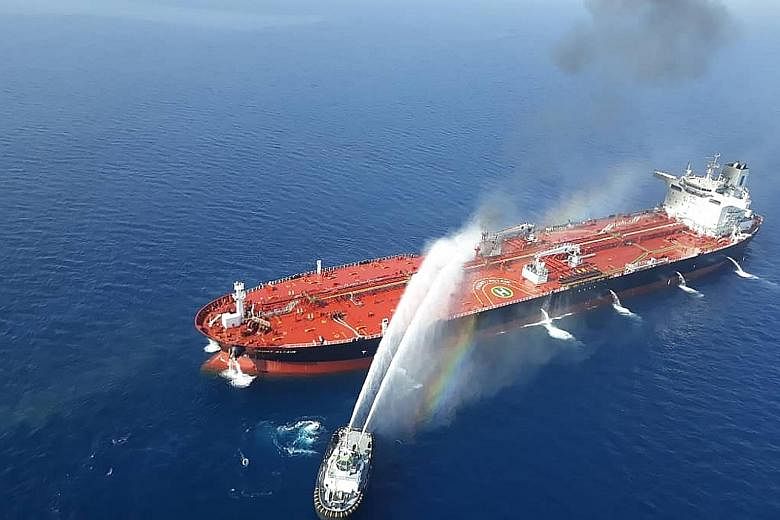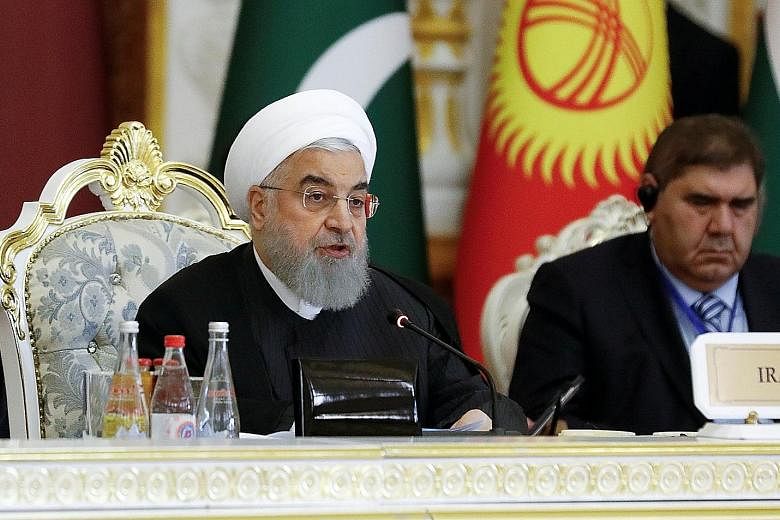DUSHANBE • Iran will continue scaling back compliance with a nuclear deal unless other signatories to the pact show "positive signals", the Iranian President said yesterday as tensions with the US escalated over tanker attacks in the Gulf region.
Iran stopped complying last month with some commitments in the 2015 nuclear deal, that was agreed with global powers, after the United States unilaterally withdrew from the accord last year and ratcheted up sanctions on Teheran.
"Obviously, Iran cannot stick to this agreement unilaterally," President Hassan Rouhani told Russian, Chinese and other Asian leaders at a conference in Tajikistan.
His comments follow rising tensions with Washington, which has accused Teheran of carrying out last Thursday's attacks on two oil tankers in a vital oil shipping route at the mouth of the Gulf. Teheran has denied having any role.
Mr Rouhani did not refer to last week's tanker incident in his speech to the Conference on Interaction and Confidence Building Measures in Asia, being held in the Tajikistan capital, Dushanbe.
"It is necessary that all the sides of this agreement contribute to restoring it," he said, adding that Iran needed to see "positive signals" from other signatories to the pact, which includes Russia, China, Britain, France and Germany.
He did not give details on what actions Iran would take or say what positive signals Teheran wanted to see.
Russian President Vladimir Putin said Moscow would adhere to the agreement and urged other signatories to follow suit.
"We believe that the only sensible decision is for all deal participants to honour commitments," Mr Putin told the conference.
Teheran said last month that Iran would start enriching uranium at a higher level, unless world powers protected its economy from US sanctions within 60 days.
Washington has ratcheted up pressure on Iran, saying it wants to prevent Teheran from developing a nuclear bomb, rein in its ballistic missile programme and end what it calls Iranian meddling in the Middle East.
Teheran has said its nuclear programme is peaceful and will not be stopped, adding that its missile work is for defence and accuses the US of destabilising the region.
France and other European signatories to the nuclear deal, that aimed to curb Iran's nuclear work, have said that they want to save the accord, but many of their companies have cancelled deals with Teheran, under pressure from the US.
Meanwhile, oil tanker owners face spiralling insurance costs to load cargoes from the world's largest crude-export region after the latest round of attacks on vessels.
War-risk premiums that owners pay for each visit to the Persian Gulf have now surged to at least US$185,000 (S$254,000) for supertankers, according to people with knowledge of the market.
They had risen to US$50,000 after the attacks a month ago.
Both owners and the companies that charter their ships paused bookings in the immediate aftermath of the attacks last Thursday as they re-evaluated risks to shipping barrels from the Middle East in the wake of attacks on two more tankers just a month after similar incidents. Insurance costs in the Persian Gulf are soaring.
"We need to remember that some 30 per cent of the world's crude oil passes through the strait," said Intertanko chairman Paolo d'Amico, the biggest trade group for tanker owners. "If the waters are becoming unsafe, the supply to the entire Western world could be at risk."
REUTERS, BLOOMBERG


